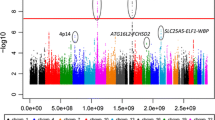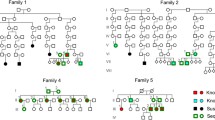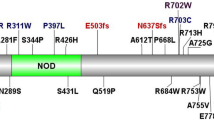Abstract
Inflammatory bowel disease (IBD; MIM# 266600) is subdivided on the basis of clinical findings as either Crohn’s disease (CD), ulcerative colitis (UC), or indeterminate colitis (IC). Three previously described mutations within the IBD susceptibility gene CARD15 (R702W, G908R, 1007fs) increase susceptibility to CD with a terminal ileal and/or ileocolonic location and fibrostenosing behavior. We undertook an association study using 477 unrelated IBD patients (248 CD, 172 UC, 57 IC) and 104 population controls to determine whether these previously described associations could be replicated in a small, accurately phenotyped cohort. Case-control and family-based approaches were employed to analyze CARD15 mutant allele and haplotype data. Analyses were initially performed in unstratified IBD cohorts. The R702W mutant allele was associated with CD on case-control analysis (q=0.036, P=.004), and 1007fs with CD on pedigree disequilibrium testing (P=.020). All 3 CARD15 mutations increased susceptibility to a variety of CD subphenotypic manifestations, including early-onset CD in individuals with a family history of IBD, and CD complicated by extraintestinal disease. We also present evidence to suggest that R702W may predispose to a more generalized form of CD. Additionally, we confirm that CARD15 mutations are associated with terminal ileal/ileocolonic, and to a lesser extent, fibrostenosing CD.
Similar content being viewed by others
References
Price AB (1978) Overlap in the spectrum of non-specific inflammatory bowel disease—‘colitis indeterminate’. J Clin Pathol 31:567–577
Hugot JP, Chamaillard M, Zouali H, Lesage S, Cezard JP, Belaiche J, Almer S, Tysk C, O’Morain CA, Gassull M, Binder V, Finkel Y, Cortot A, Modigliani R, Laurent-Puig P, Gower-Rousseau C, Macry J, Colombel JF, Sahbatou M, Thomas G (2001) Association of NOD2 leucine-rich repeat variants with susceptibility to Crohn’s disease. Nature 411:599–603
Ogura Y, Bonen DK, Inohara N, Nicolae DL, Chen FF, Ramos R, Britton H, Moran T, Karaliuskas R, Duerr RH, Achkar JP, Brant SR, Bayless TM, Kirschner BS, Hanauer SB, Nunez G, Cho JH (2001) A frameshift mutation in NOD2 associated with susceptibility to Crohn’s disease. Nature 411:603–606
Hampe J, Frenzel H, Mirza MM, Croucher PJ, Cuthbert A, Mascheretti S, Huse K, Platzer M, Bridger S, Meyer B, Nurnberg P, Stokkers P, Krawczak M, Mathew CG, Curran M, Schreiber S (2002) Evidence for a NOD2-independent susceptibility locus for inflammatory bowel disease on chromosome 16p. Proc Natl Acad Sci U S A 99:321–326
Watanabe T, Kitani A, Murray PJ, Strober W (2004) NOD2 is a negative regulator of Toll-like receptor 2-mediated T helper type 1 responses. Nat Immunol 5:800–808
Netea MG, Kullberg BJ, de Jong DJ, Franke B, Sprong T, Naber TH, Drenth JP, Van der Meer JW (2004) NOD2 mediates anti-inflammatory signals induced by TLR2 ligands: Implications for Crohn’s disease. Eur J Immunol 34:2052–2059
Inohara N, Nunez G: NODs (2003) intracellular proteins involved in inflammation and apoptosis. Nat Rev Immunol 3:371–382
Aldhous MC, Nimmo ER, Satsangi J (2003) NOD2/CARD15 and the Paneth cell: Another piece in the genetic jigsaw of inflammatory bowel disease. Gut 52:1533–1535
Hampe J, Cuthbert A, Croucher PJ, Mirza MM, Mascheretti S, Fisher S, Frenzel H, King K, Hasselmeyer A, MacPherson AJ, Bridger S, van Deventer S, Forbes A, Nikolaus S, Lennard-Jones JE, Foelsch UR, Krawczak M, Lewis C, Schreiber S, Mathew CG (2001) Association between insertion mutation in NOD2 gene and Crohn’s disease in German and British populations. Lancet 357:1925–1928
Cuthbert AP, Fisher SA, Mirza MM, King K, Hampe J, Croucher PJ, Mascheretti S, Sanderson J, Forbes A, Mansfield J, Schreiber S, Lewis CM, Mathew CG (2002) The contribution of NOD2 gene mutations to the risk and site of disease in inflammatory bowel disease. Gastroenterology 122:867–874
Gasche C, Alizadeh BZ, Pena AS (2003) Genotype-phenotype correlations: How many disorders constitute inflammatory bowel disease? Eur J Gastroenterol Hepatol 15:599–606
Ahmad T, Armuzzi A, Bunce M, Mulcahy-Hawes K, Marshall SE, Orchard TR, Crawshaw J, Large O, de Silva A, Cook JT, Barnardo M, Cullen S, Welsh KI, Jewell DP (2002) The molecular classification of the clinical manifestations of Crohn’s disease. Gastroenterology 122:854–866
Hampe J, Grebe J, Nikolaus S, Solberg C, Croucher PJ, Mascheretti S, Jahnsen J, Moum B, Klump B, Krawczak M, Mirza MM, Foelsch UR, Vatn M, Schreiber S (2002) Association of NOD2 (CARD 15) genotype with clinical course of Crohn’s disease: A cohort study. Lancet 359:1661–1665
Lesage S, Zouali H, Cezard JP, Colombel JF, Belaiche J, Almer S, Tysk C, O’Morain C, Gassull M, Binder V, Finkel Y, Modigliani R, Gower-Rousseau C, Macry J, Merlin F, Chamaillard M, Jannot AS, Thomas G, Hugot JP (2002) CARD15/NOD2 mutational analysis and genotype-phenotype correlation in 612 patients with inflammatory bowel disease. Am J Hum Genet 70:845–857
Leong RW, Armuzzi A, Ahmad T, Wong ML, Tse P, Jewell DP, Sung JJ (2003) NOD2/CARD15 gene polymorphisms and Crohn’s disease in the Chinese population. Aliment Pharmacol Ther 17:1465–1470
Yamazaki K, Takazoe M, Tanaka T, Kazumori T, Nakamura Y (2002) Absence of mutation in the NOD2/CARD15 gene among 483 Japanese patients with Crohn’s disease. J Hum Genet 47:469–472
Murillo L, Crusius JB, van Bodegraven AA, Alizadeh BZ, Pena AS (2002) CARD15 gene and the classification of Crohn’s disease. Immunogenetics 54:59–61
Gasche C, Scholmerich J, Brynskov J, D’Haens G, Hanauer SB, Irvine EJ, Jewell DP, Rachmilewitz D, Sachar DB, Sandborn WJ, Sutherland LR (2000) A simple classification of Crohn’s disease: Report of the Working Party for the World Congresses of Gastroenterology, Vienna 1998. Inflamm Bowel Dis 6:8–15
Farmer M, Petras RE, Hunt LE, Janosky JE, Galandiuk S (2000) The importance of diagnostic accuracy in colonic inflammatory bowel disease. Am J Gastroenterol 95:3184–3188
Crawford NP, Colliver DW, Funke AA, Young MN, Kelley S, Cobbs GA, Petras RE, Galandiuk S (2005) Characterization of genotype-phenotype relationships and stratification by the CARD15 variant genotype for inflammatory bowel disease susceptibility loci using multiple short tandem repeat genetic markers. Hum Mutat 25:156–166
Storey JD, Tibshirani R (2003) Statistical significance for genomewide studies. Proc Natl Acad Sci USA 100:9440–9445
Storey JD (2003) The positive false discovery rate: A Bayesian interpretation and the q-value. Annals of Statistics 31:2013–2035
van den Oord EJ, Sullivan PF (2003) False discoveries and models for gene discovery. Trends Genet 19:537–542
Fisher RA (1948) Combining independent tests of significance. American Statistician 2:30
Martin ER, Monks SA, Warren LL, Kaplan NL (2000) A test for linkage and association in general pedigrees: The pedigree disequilibrium test. Am J Hum Genet 67:146–154
Martin ER, Bass MP, Kaplan NL (2001) Correcting for a potential bias in the pedigree disequilibrium test. Am J Hum Genet 68:1065–1067
Clayton D (1999) A generalization of the transmission/disequilibrium test for uncertain- haplotype transmission. Am J Hum Genet 65:1170–1177
Author information
Authors and Affiliations
Corresponding author
Rights and permissions
About this article
Cite this article
Crawford, N.P.S., Colliver, D.W., Eichenberger, M.R. et al. CARD15 Genotype-Phenotype Relationships in a Small Inflammatory Bowel Disease Population with Severe Disease Affection Status. Dig Dis Sci 52, 2716–2724 (2007). https://doi.org/10.1007/s10620-006-9208-z
Received:
Accepted:
Published:
Issue Date:
DOI: https://doi.org/10.1007/s10620-006-9208-z




